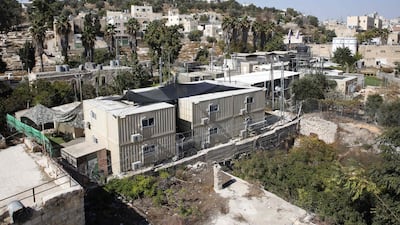Israeli authorities advanced plans on Tuesday for 1,292 settler homes in a new push by Prime Minister Benjamin Netanyahu's government to expand settlements in the occupied West Bank, an NGO said.
The approvals came after government officials pledged a major boost in settlement home approvals this year, with US President Donald Trump so far much less critical of such plans than his predecessor Barack Obama.
Settlement watchdog Peace Now reported the approvals by a committee overseeing settlement construction in the West Bank.
A list provided by the NGO showed homes to be built in several locations across the territory, including 146 in Nokdim, a southern West Bank settlement near Bethlehem where Defence Minister Avigdor Lieberman lives.
Hagit Ofran of Peace Now said further approvals were likely on Wednesday, with more than 2,000 units expected to be on the agenda over the course of the two-day meeting.
_______________
Read more:
Rights group blasts Israeli banks for settlement expansion
Fresh optimism on peace process as Trump devotes his 'heart and soul' to deal
_______________
Separately on Monday, an Israeli committee approved permits for 31 settler homes in Hebron, the first such green light for the flashpoint West Bank city since 2002.
Several hundred Israeli settlers live in the heart of Hebron under heavy military guard, among some 200,000 Palestinians.
The Hebron units are to be built on Shuhada Street, formerly an important market road leading to a flashpoint holy site where the biblical Abraham is believed to have been buried.
The street is now largely closed off to Palestinians.
Palestinian presidential spokesman Nabil Abu Rudeina condemned the latest spate of settlement activity.
"Netanyahu defies the world, and especially President Trump's administration, with his insistence on continuing settlements on the land of the state of Palestine," he said in a statement published by official news agency WAFA.
- Two-state solution threatened -
Trump is seeking to restart peace talks between Israel and the Palestinians, which have been frozen since a US-led initiative collapsed in 2014.
Settlement building in the West Bank and annexed east Jerusalem is considered illegal under international law.
It is also seen as a major obstacle to peace as the settlements are built on land the Palestinians see as part of their future state.
Netanyahu's right-wing coalition government leans heavily on settlers and their supporters to maintain its thin parliamentary majority.
Israel took heavy criticism on settlement construction from Obama's administration, but that has not been the case with Trump.
Israeli officials say a total of around 12,000 housing units will be given various stages of approval this year, four times the amount in 2016.
Last month, US ambassador to Israel David Friedman, himself a supporter of settlements, enraged Palestinians when he told an Israeli TV interviewer that Israel is "only occupying two percent of the West Bank".
The Yesha Council, which represents settlers across the West Bank, welcomed the ambassador's comments.
More than 60 percent of the West Bank is under near complete Israeli control, the UN says, while a further portion of the territory is under Israeli security control.
The portion of the West Bank that is in theory under both Palestinian civilian and security control still sees raids by Israeli soldiers.
About 430,000 Israeli settlers live among 2.6 million Palestinians in the West Bank, occupied by Israel in the 1967 Six-Day War.
The Palestinians have grown increasingly concerned by Trump and his team - including Friedman - who have yet to publicly commit to the idea of an independent Palestinian state alongside Israel, the so-called "two-state solution".
Prominent members of Netanyahu's coalition openly oppose the idea of a Palestinian state and advocate annexing most of the West Bank.
Netanyahu recently said he plans no uprooting of settlements, blaming Palestinian "incitement" and attacks against Israelis, among other issues, for the lack of progress in peace efforts.

